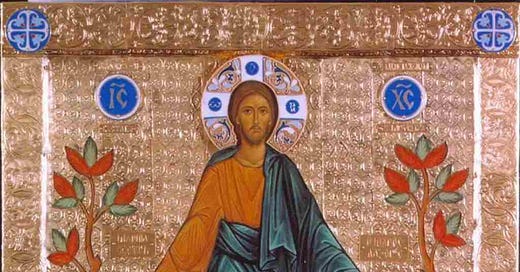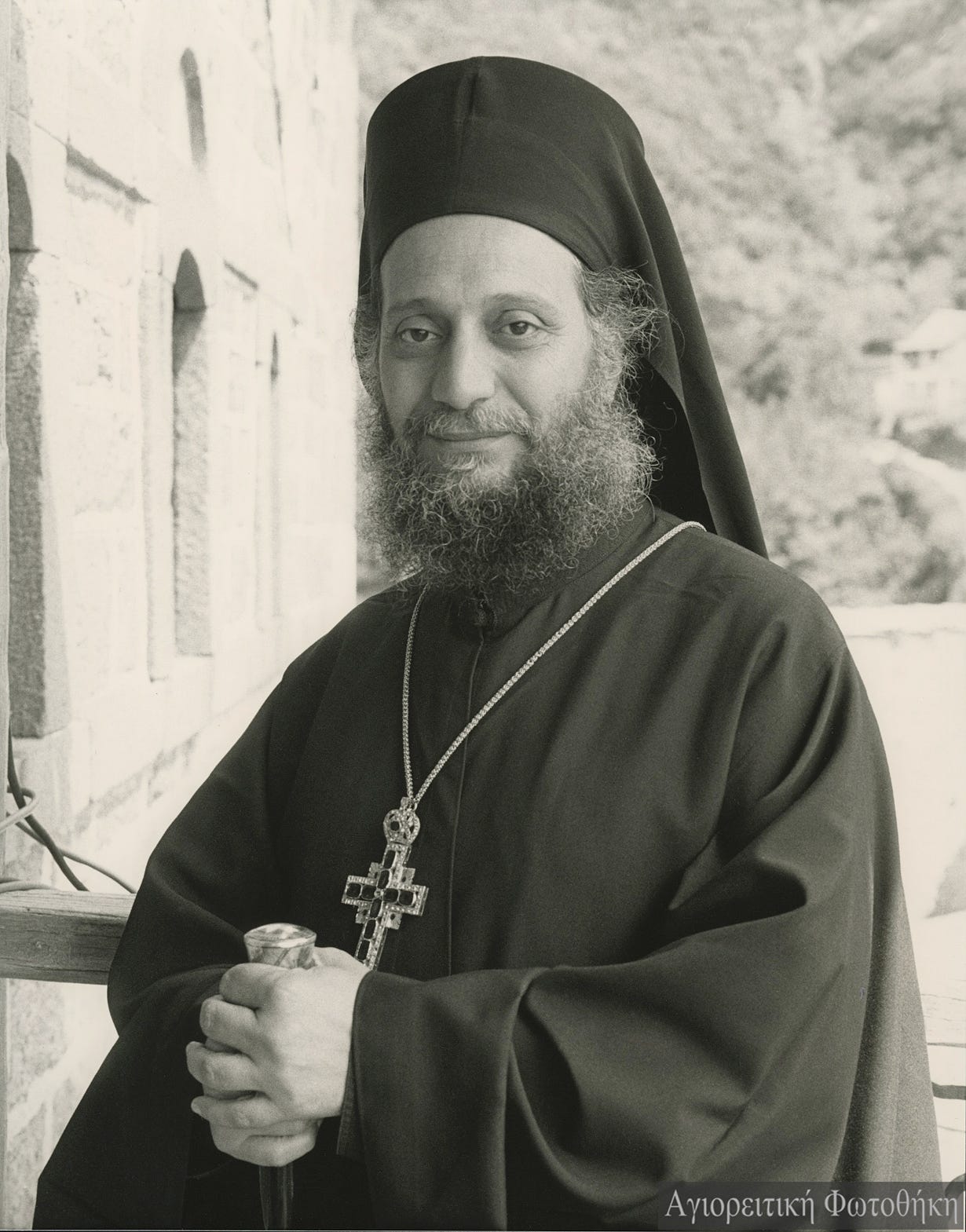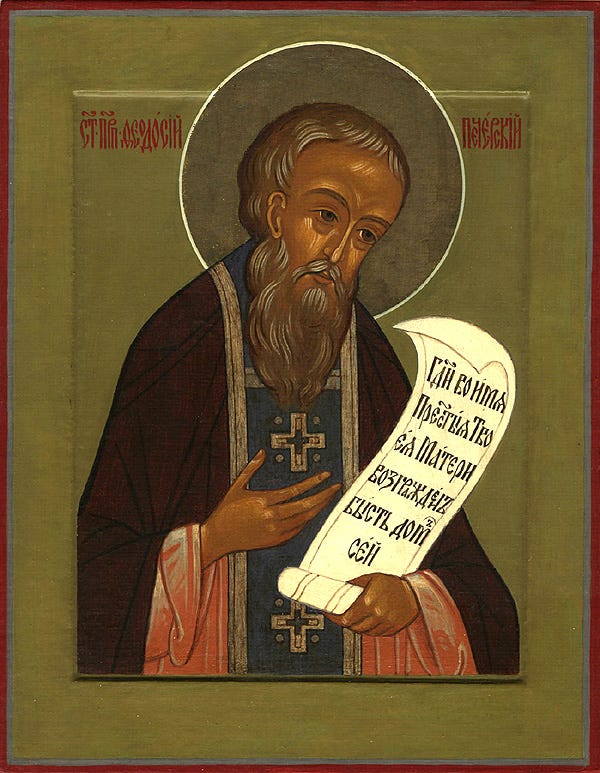“When we begin to pray, since we are not ready, since we do not feel God, since He seems unknown, difficult, dark to us—since it seems that He does not love us, that He does not exist for us—we abandon prayer. But it is precisely when I embrace this hardship, when I realize that I must pray alone in the darkness, when I accept the hell and captivity of my own hell and pray there without hope, without God, without a single ray of light—because I am not worthy of it—then God acts. Then He comes and lifts the burden from my heart, giving me relief.
Thus, what draws God is not my rushing but my offering, my effort, my dedication. God will grant me swiftness from the moment I empty myself and renounce myself by accepting to embody within me the entire wisdom of the Church.”
+ Elder Aimilianos of Simonopetra
Acts 5:21-33 (Epistle)
21 And when they heard that, they entered the temple early in the morning and taught. But the high priest and those with him came and called the council together, with all the elders of the children of Israel, and sent to the prison to have them brought.
22 But when the officers came and did not find them in the prison, they returned and reported,
23 saying, “Indeed we found the prison shut securely, and the guards standing outside before the doors; but when we opened them, we found no one inside!”
24 Now when the high priest, the captain of the temple, and the chief priests heard these things, they wondered what the outcome would be.
25 So one came and told them, saying, “Look, the men whom you put in prison are standing in the temple and teaching the people!”
26 Then the captain went with the officers and brought them without violence, for they feared the people, lest they should be stoned.
27 And when they had brought them, they set them before the council. And the high priest asked them,
28 saying, “Did we not strictly command you not to teach in this name? And look, you have filled Jerusalem with your doctrine, and intend to bring this Man’s blood on us!”
29 But Peter and the other apostles answered and said: “We ought to obey God rather than men.
30 The God of our fathers raised up Jesus whom you murdered by hanging on a tree.
31 Him God has exalted to His right hand to be Prince and Savior, to give repentance to Israel and forgiveness of sins.
32 And we are His witnesses to these things, and so also is the Holy Spirit whom God has given to those who obey Him.”
33 When they heard this, they were furious and plotted to kill them.
John 6:14-27 (Gospel)
14 Then those men, when they had seen the sign that Jesus did, said, “This is truly the Prophet who is to come into the world.”
15 Therefore when Jesus perceived that they were about to come and take Him by force to make Him king, He departed again to the mountain by Himself alone.
16 Now when evening came, His disciples went down to the sea,
17 got into the boat, and went over the sea toward Capernaum. And it was already dark, and Jesus had not come to them.
18 Then the sea arose because a great wind was blowing.
19 So when they had rowed about three or four miles, they saw Jesus walking on the sea and drawing near the boat; and they were afraid.
20 But He said to them, “It is I; do not be afraid.”
21 Then they willingly received Him into the boat, and immediately the boat was at the land where they were going.
22 On the following day, when the people who were standing on the other side of the sea saw that there was no other boat there, except that one which His disciples had entered, and that Jesus had not entered the boat with His disciples, but His disciples had gone away alone –
23 however, other boats came from Tiberias, near the place where they ate bread after the Lord had given thanks –
24 when the people therefore saw that Jesus was not there, nor His disciples, they also got into boats and came to Capernaum, seeking Jesus.
25 And when they found Him on the other side of the sea, they said to Him, “Rabbi, when did You come here?”
26 Jesus answered them and said, “Most assuredly, I say to you, you seek Me, not because you saw the signs, but because you ate of the loaves and were filled.
27 Do not labor for the food which perishes, but for the food which endures to everlasting life, which the Son of Man will give you, because God the Father has set His seal on Him.”
Ven. Theodosius, Abbot of the Kiev Caves Monastery and Founder of Cœnobitic Monasticism in Russia (1074)
Saint Theodosius of the Caves, was the Father of monasticism in Russia. He was born at Vasilevo, not far from Kiev. From his youth he felt an irresistible attraction for the ascetic life, and led an ascetic lifestyle while still in his parental home. He disdained childish games and attractions, and constantly went to church. He asked his parents to let him study the holy books, and through his ability and rare zeal, he quickly learned to read the books, so that everyone was amazed at his intellect.
When he was fourteen, he lost his father and remained under the supervision of his mother, a strict and domineering woman who loved her son very much. Many times she chastised her son for his yearning for asceticism, but he remained firmly committed to his path.
At the age of twenty-four, he secretly left his parents’ home and Saint Anthony at the Kiev Caves monastery blessed him to receive monastic tonsure with the name Theodosius. After four years his mother found him and with tearfully begged him to return home, but the saint persuaded her to remain in Kiev and to become a nun in the monastery of Saint Nicholas at the Askold cemetery.
Saint Theodosius toiled at the monastery more than others, and he often took upon himself some of the work of the other brethren. He carried water, chopped wood, ground up the grain, and carried the flour to each monk. On cold nights he uncovered his body and let it serve as food for gnats and mosquitoes. His blood flowed, but the saint occupied himself with handicrafts, and sang Psalms. He came to church before anyone else and, standing in one place, he did not leave it until the end of services. He also listened to the readings with particular attention.
In 1054 Saint Theodosius was ordained a hieromonk, and in 1057 he was chosen igumen. The fame of his deeds attracted a number of monks to the monastery, at which he built a new church and cells, and he introduced cenobitic rule of the Studion monastery, a copy of which he commissioned at Constantinople.
As igumen, Saint Theodosius continued his arduous duties at the monastery. He usually ate only dry bread and cooked greens without oil, and spent his nights in prayer without sleep. The brethren often noticed this, although the saint tried to conceal his efforts from others.
No one saw when Saint Theodosius dozed lightly, and usually he rested while sitting. During Great Lent the saint withdrew into a cave near the monastery, where he struggled unseen by anyone. His attire was a coarse hairshirt worn next to his body. He looked so much like a beggar that it was impossible to recognize in this old man the renowned igumen, deeply respected by all who knew him.
Once, Saint Theodosius was returning from visiting the Great Prince Izyaslav. The coachman, not recognizing him, said gruffly, “You, monk, are always on holiday, but I am constantly at work. Take my place, and let me ride in the carriage.” The holy Elder meekly complied and drove the servant. Seeing how nobles along the way bowed to the monk driving the horses, the servant took fright, but the holy ascetic calmed him, and gave him a meal at the monastery. Trusting in God’s help, the saint did not keep a large supply of food at the monastery, and therefore the brethren were in want of their daily bread. Through his prayers, however, unknown benefactors appeared at the monastery and furnished the necessities for the brethren.
The Great Princes, especially Izyaslav, loved to listen to the spiritual discourses of Saint Theodosius. The saint was not afraid to denounce the mighty of this world. Those unjustly condemned always found a defender in him, and judges would review matters at the request of the igumen. He was particularly concerned for the destitute. He built a special courtyard for them at the monastery where anyone in need could receive food and drink. Sensing the approach of death, Saint Theodosius peacefully fell asleep in the Lord in the year 1074. He was buried in a cave which he dug, where he secluded himself during fasting periods.
The relics of the ascetic were found incorrupt, and he was glorified as a saint in 1108. Of the written works of Saint Theodosius six discourses, two letters to Great Prince Izyaslav, and a prayer for all Christians have survived to our time.
The Life of Saint Theodosius was written by Saint Nestor the Chronicler (October 27), a disciple of the great Abba, only thirty years after his repose, and it was always one of the favorite readings of the Russian nation. Saint Theodosius is also commemorated on September 2 and 28.
The Fidelity and Love of the Myrrh-Bearing Women
by Metropolitan Philaret of Eastern American and New York (+1985)
Here is something characteristic: reading the Gospel, our attention cannot but be drawn to the following circumstance. When the Apostles themselves see the risen Teacher, they are not immediately seized by full faith; and when others tell them that their Teacher is risen, they cannot believe this as they should. The Holy Evangelist Mark even mentions that once, when the Lord appeared to them, He began to upbraid them – that is, directly to rebuke them for their unbelief and their hard-heartedness, for having heard of His Resurrection but not being capable of believing those who spoke to them about the Resurrection.
But if the Apostles were not able to believe in the miracle of the Resurrection, the Myrrh-Bearers did immediately recognize the One Who appeared to them. They were excited and ran enthusiastically, but at the same time fearfully, from the Lord’s Grave; initially they were afraid of telling this to anyone, given how unusual and strange was that which they had heard from the Angel. But as they were fleeing, He Whom they had wished to anoint with sweet-smelling myrrh appeared to them. He appeared and said only one word to them: “Rejoice!” The faithful Myrrh-Bearers immediately recognized that it was the Savior appearing to them, and they worshipped Him joyfully.
Why such joy? The Most Blessed Metropolitan Anthony pointed out how much fidelity to truth and infidelity to it mean to a man. Fidelity that is constant and firm in all things is the opposite of the cowardice of infidelity. Such was the case here, Vladyka Anthony said. The Apostles, rather than following their Teacher when He (to speak in modern terms) was arrested, fled in various directions. When the Lord went to raise Lazarus, the Apostle Thomas said: Let us go that we might die with Him (John 11:16). This did not meet with a single objection from the Apostles. This means that they were in agreement with the Apostle Thomas. Yet in the garden of Gethsemane it came out that they were frightened, and they fled. Only the apostle of love, the Apostle John, stood up to this fear and was inseparable from the Teacher even to Golgotha, where he stood with the Savior’s All-Holy Mother.
Yet the Apostles fled – and this is that infidelity and faint-heartedness, which cast a shadow over their eyes, that was noted by Vladyka Anthony. But the faithful Myrrh-Bearers went with Him to Golgotha and stood at the very Cross grieving and, at the same time, trying somehow to relieve by their love and compassion the terrible and superhuman grief of the All-Blessed Virgin Mary.
They did not abandon Him. We know from the Gospel how He was buried, and the Myrrh-Bearing Women saw where He was laid. The Apostles were not there… they had fled. The Myrrh-Bearing Women, however, remained faithful to Him to the very end and therefore, as Vladyka Anthony says, their conscience and inner spiritual intuition remained bright and clean. Therefore they immediately recognized the One Who appeared to them, worshipping Him without any hesitation as their beloved Teacher and the Conqueror of death.
Imagine only what the holy Myrrh-Bearer Mary Magdalene underwent as she wept inconsolably at the tomb of Him Who had once freed her from unclean hostile spirits, having cast out seven demons from her. After this was accomplished she became a constant follower of her beloved Teacher. Here she is weeping inconsolably at His tomb, and suddenly she hears from Someone that very same voice saying “Mary” – that dear and unforgettable voice, which had once cast out seven demons from her. If Mary’s heart did not burst from delight and joy, this was only because it was the Source of Life, Christ Himself, Who spoke with her. What a transition, from inconsolable grief to rapturous joy!
Therefore let us remember what fidelity and devotion mean, and what a clean conscience means. The holy women did everything in order to show attention to their Teacher. Fearing no dangers they go to Golgotha, they accompany Him, they stand at the Cross on Golgotha, they watch, looking reverently upon how their Teacher is buried – and for this they have the joy of seeing Him in glory, risen from the dead, before the Apostles.
Remember how important it is to be faithful to God. Fidelity and devotion to Him enlighten the human conscience and illumine the human mind. Conversely, when one person after another commits acts of infidelity and treason to the Lord and to truth, his soul becomes hardened, his conscience is coarsened and darkened, and it becomes difficult for him to recognize truth, difficult to venerate it.
Everyone should remember this, and always pray that the Lord would teach us to be faithful to Him always and in everything, just as the Holy and Glorious Myrrh-Bearing Women were faithful to Him. Their fidelity brought them through to the end, and they received the unspeakable joy of seeing their Teacher risen and of immediately worshipping Him. The example of their fidelity and love should be an edifying example for every Christian soul; an example, when followed, that will demonstrate one’s fidelity to the Lord to the end and grant the joy of beholding Him. Amen.
This week’s calendar reminders:
Monday 4/28: Matins 8:30 a.m.
Tuesday 4/29: no services or events
Wednesday 4/30: no services or events
Thursday 5/1: Matins 8:30 a.m.
Friday 5/2: Matins 8:30 a.m.
Saturday 5/3: Catechumen Class 4:30 p.m.; Choir Practice 5 p.m.; Great Vespers 6 p.m.
Sunday 5/4: Divine Liturgy 9:15 a.m.
CLICK BELOW to donate online:
Christ the Savior Orthodox Church is located in Southbury, Connecticut, and is part of the New England Diocese of the Orthodox Church of America.
Mailing address: Christ the Savior Church, 1070 Roxbury Road, Southbury, CT 06488
PLEASE DONATE to help our parish do the work of the Lord, thrive and grow, and extend the Kingdom of God. May the Lord bless your generosity!
Fr. Moses Locke can be reached at frmoseslocke@gmail.com











